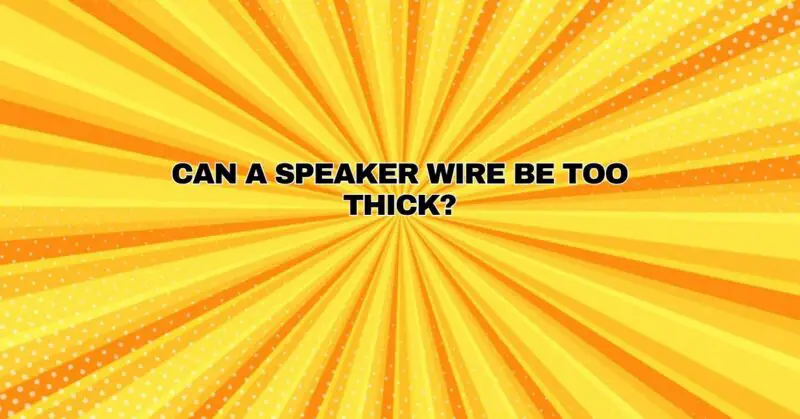When setting up an audio system, selecting the right speaker wire is a crucial step in achieving optimal sound quality. One common question that arises is whether a speaker wire can be “too thick.” In this comprehensive guide, we’ll explore the concept of wire gauge in audio systems, its impact on performance, and whether there’s such a thing as a speaker wire that is too thick for your needs.
Understanding Wire Gauge
Wire gauge, often measured in American Wire Gauge (AWG), is a numerical designation that represents the thickness or diameter of a wire. In the context of speaker wires, lower AWG numbers indicate thicker wires, while higher numbers indicate thinner wires. For example, a 12 AWG wire is thicker than a 16 AWG wire.
The Role of Wire Gauge in Speaker Wires
The wire gauge you choose for your speaker wires can have a significant impact on the performance of your audio system. Here’s how wire gauge affects audio systems:
1. Electrical Resistance: Thicker wires (lower AWG numbers) have lower electrical resistance. Lower resistance allows more electrical current to flow through the wire with less loss. This is particularly important in high-powered audio systems where the amplifier needs to deliver a substantial amount of current to the speakers.
2. Distance Considerations: The length of your speaker cable run is a critical factor. Longer cable runs can introduce more resistance, which may result in signal loss if the wire gauge is too thin. Thicker wires are generally recommended for longer cable runs to minimize this effect.
3. Power Handling: Thicker wires can handle higher power levels without overheating or experiencing significant voltage drop. If your audio system involves high-powered amplifiers, using thicker wires can help ensure reliable performance.
4. Bass Response: Some audio enthusiasts argue that thicker wires can enhance bass response, as they can provide a more robust current flow to power hungry subwoofers. However, the impact on bass response is typically more noticeable in high-powered systems.
When Can a Speaker Wire Be Too Thick?
While thicker wires generally offer advantages in terms of lower resistance and better power handling, there are situations where a speaker wire can be considered “too thick”:
- Compatibility: Extremely thick wires (e.g., 2 AWG or larger) may be challenging to work with, especially when connecting them to binding posts or connectors on speakers and amplifiers. Ensure that your components can accommodate the wire’s thickness.
- Cost: Thicker wires are often more expensive than thinner ones. If your audio system’s power requirements and cable lengths do not demand extremely thick wires, you may find that the added cost does not justify the incremental performance gain.
- Flexibility: Thicker wires are less flexible than thinner ones. In situations where cable routing requires flexibility or when dealing with tight spaces, excessively thick wires may be cumbersome to work with.
Choosing the Right Wire Gauge
Selecting the appropriate wire gauge for your audio system involves considering the following factors:
- Power Requirements: Assess the power needs of your speakers and amplifiers. High-powered systems benefit from thicker wires.
- Cable Length: Longer cable runs benefit from thicker wires to minimize resistance and signal loss.
- Component Compatibility: Ensure that your speakers and amplifiers can accommodate the chosen wire gauge’s thickness.
- Budget: Balance your budget with the wire gauge that best suits your needs. Don’t overspend on excessively thick wires if your system doesn’t require them.
Conclusion
In the world of speaker wires, there is a practical range of wire gauges that cater to different audio system requirements. While extremely thick wires can offer advantages in terms of lower resistance and better power handling, they may not always be necessary or practical for every audio setup. Carefully assess your system’s needs, budget, and compatibility when selecting speaker wire gauge, and you’ll be well on your way to achieving the best sound quality for your setup without the risk of having a wire that is “too thick.”


